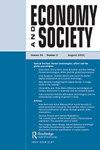“分配人们在社会中的位置”:学校成绩和功绩的量化
IF 4.3
2区 社会学
Q1 ECONOMICS
引用次数: 0
摘要
任人唯贤的政治理想日益受到攻击,但在许多自诩为自由民主国家(包括德国)的国家认同中,任人唯贤的政治理想继续占据核心地位。一个尚未得到充分探讨的问题是,精英思维在哪里以及如何在个人中根深蒂固,以解释其普遍的吸引力。本文认为,学校的年级起着举足轻重的作用。在德国一所综合学校进行的人种学田野调查显示,学生们一直在为评分辩护,尽管他们自己的分数经常很低。学生们的论点唤起了精英主义的核心主题,即改善、等级制度和社会地位上升。为了解释这一发现,分数被置于一个更广泛的量化理论中,认为分数作为数字的能力鼓励了精英思维。本文章由计算机程序翻译,如有差异,请以英文原文为准。
‘To assign people their place in society’: School grades and the quantification of merit
Abstract The political ideal of meritocracy has increasingly come under attack, but continues to figure centrally in the national identity of many self-declared liberal democracies, including Germany. A question which remains underexplored is where and how meritocratic thinking becomes ingrained in individuals to account for its pervasive appeal. This paper argues that the school grade plays a pivotal role. Ethnographic fieldwork in a German comprehensive school revealed that students consistently defended grading even though they often received very low grades themselves. The pupils’ arguments evoked core meritocratic motifs of betterment, hierarchy and social ascent. In order to explain this finding, grades are situated in a wider theory of quantification, arguing that it is in their capacity as numbers that grades encourage meritocratic thinking.
求助全文
通过发布文献求助,成功后即可免费获取论文全文。
去求助
来源期刊

Economy and Society
Multiple-
CiteScore
6.30
自引率
5.90%
发文量
23
期刊介绍:
This radical interdisciplinary journal of theory and politics continues to be one of the most exciting and influential resources for scholars in the social sciences worldwide. As one of the field"s leading scholarly refereed journals, Economy and Society plays a key role in promoting new debates and currents of social thought. For 37 years, the journal has explored the social sciences in the broadest interdisciplinary sense, in innovative articles from some of the world"s leading sociologists and anthropologists, political scientists, legal theorists, philosophers, economists and other renowned scholars.
 求助内容:
求助内容: 应助结果提醒方式:
应助结果提醒方式:


